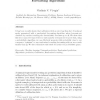Free Online Productivity Tools
i2Speak
i2Symbol
i2OCR
iTex2Img
iWeb2Print
iWeb2Shot
i2Type
iPdf2Split
iPdf2Merge
i2Bopomofo
i2Arabic
i2Style
i2Image
i2PDF
iLatex2Rtf
Sci2ools
123
click to vote
ALT
2007
Springer
2007
Springer
On Calibration Error of Randomized Forecasting Algorithms
It has been recently shown that calibration with an error less than ∆ > 0 is almost surely guaranteed with a randomized forecasting algorithm, where forecasts are obtained by random rounding the deterministic forecasts up to ∆. We show that this error cannot be improved for a vast majority of sequences: we prove that, using a probabilistic algorithm, we can effectively generate with probability close to one a sequence “resistant” to any randomized rounding forecasting with an error much smaller than ∆. We also reformulate this result by means of a probabilistic game. Key words: Machine learning, Universal prediction, Randomized prediction, Algorithmic prediction, Calibration, Randomized rounding
Algorithmic Prediction | ALT 2007 | Machine Learning | Randomized Forecasting Algorithm | Randomized Rounding Forecasting |
| Added | 14 Mar 2010 |
| Updated | 14 Mar 2010 |
| Type | Conference |
| Year | 2007 |
| Where | ALT |
| Authors | Vladimir V. V'yugin |
Comments (0)

